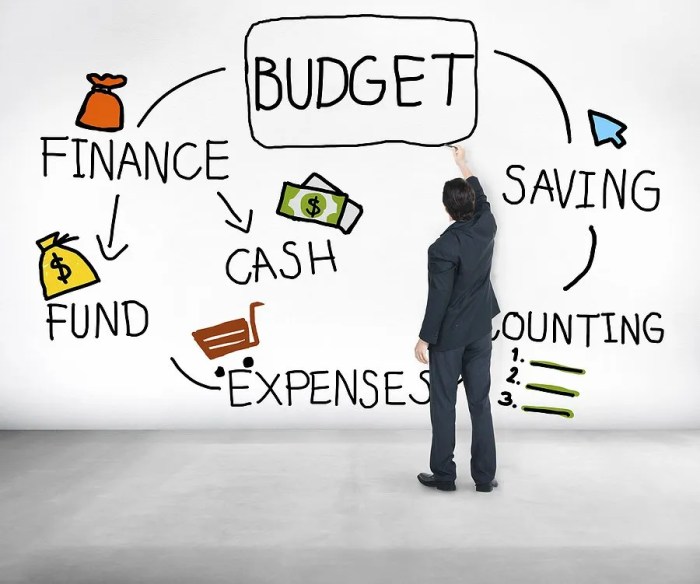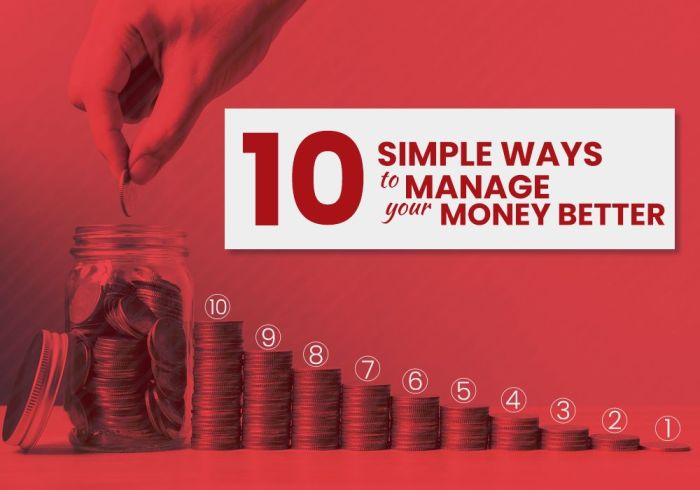Embark on a journey to financial success with our guide on managing your finances in 10 simple steps. From budgeting techniques to building an emergency fund, we’ve got you covered.
Learn how to take control of your money and secure a stable financial future with our expert tips and strategies.
Importance of Financial Management

Managing finances is crucial for individuals as it allows them to control their money effectively, make informed decisions, and secure their financial future.
Benefits of Effective Financial Management
- Setting and Achieving Financial Goals: Effective financial management helps individuals set realistic financial goals and develop a plan to achieve them.
- Emergency Preparedness: Proper financial management ensures individuals have savings to cover unexpected expenses or emergencies.
- Debt Management: By managing finances well, individuals can avoid falling into debt traps and maintain a healthy financial status.
- Building Wealth: Through smart financial management, individuals can grow their wealth over time through investments and savings.
Impact of Poor Financial Management
- Accumulation of Debt: Poor financial management can lead to overspending, borrowing beyond means, and accumulating debt that becomes difficult to repay.
- Lack of Savings: Individuals who do not manage their finances well often struggle to save for the future, leading to financial insecurity.
- Stress and Anxiety: Financial difficulties resulting from poor management can cause stress, anxiety, and strain on mental health.
- Missed Opportunities: Without effective financial management, individuals may miss out on opportunities for investments, growth, and financial stability.
Basic Budgeting Techniques

Creating a personal budget is essential for managing your finances effectively. It helps you track your income and expenses, identify areas where you can save money, and work towards your financial goals.
Steps to Create a Personal Budget
- List all sources of income: Include your salary, bonuses, rental income, etc.
- Track your expenses: Keep a record of all your spending, including bills, groceries, entertainment, etc.
- Categorize your expenses: Group your expenses into categories like housing, transportation, food, etc.
- Set financial goals: Determine what you want to achieve with your budget, whether it’s saving for a vacation or paying off debt.
- Create a budget: Allocate your income to different expense categories based on your priorities and financial goals.
- Monitor and adjust: Regularly review your budget, track your spending, and make adjustments as needed.
Importance of Tracking Expenses
Tracking your expenses is crucial to understanding where your money is going. It helps you identify areas where you may be overspending and allows you to make informed decisions on how to manage your finances better.
Tips to Reduce Unnecessary Spending
- Avoid impulse purchases: Make a shopping list and stick to it to avoid unnecessary spending on items you don’t need.
- Comparison shop: Look for deals, discounts, and sales before making a purchase to save money.
- Cut back on dining out: Cook at home more often to save money on expensive restaurant meals.
- Cancel unused subscriptions: Review your subscriptions regularly and cancel any that you no longer use or need.
- Limit luxury expenses: Identify areas where you can cut back on luxury items or services to reduce your overall spending.
Building an Emergency Fund

Having an emergency fund is crucial for financial stability and peace of mind. It serves as a safety net in case of unexpected expenses or emergencies, such as medical bills, car repairs, or job loss.
The Purpose of an Emergency Fund
An emergency fund is designed to cover unforeseen expenses without having to rely on credit cards or loans, which can lead to debt accumulation. It provides a sense of security and financial resilience during challenging times.
Strategies for Saving Money
- Set a monthly savings goal: Determine a realistic amount to save each month and make it a priority.
- Automate your savings: Set up automatic transfers from your checking account to your emergency fund to ensure consistent contributions.
- Cut back on non-essential expenses: Identify areas where you can reduce spending, such as dining out or subscription services, and redirect that money to your emergency fund.
- Use windfalls wisely: If you receive a bonus or tax refund, consider allocating a portion to your emergency fund.
Recommended Amount for an Emergency Fund
Financial experts typically recommend saving three to six months’ worth of living expenses in an emergency fund. However, the ideal amount may vary based on individual circumstances, such as income stability, family size, and financial obligations.
Last Word

Take charge of your financial well-being today by implementing these 10 simple steps. Start your path to financial freedom and peace of mind.